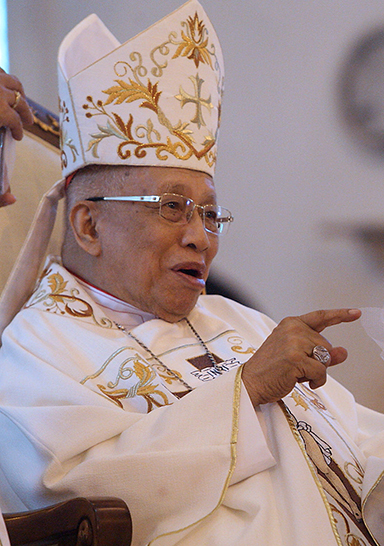
VIDAL
Cebu Archbishop Emeritus Ricardo Cardinal Vidal was six years old when he received his first Holy Communion at Luneta Park in Manila in 1937 during the first International Eucharistic Congress (IEC) held in the Philippines.
The boy later entered priesthood and rose to become head of the Cebu Archdiocese, the second biggest archdiocese in the country next to Manila. Seventy-nine years later, the country again is hosting he IEC, this time in Cebu City.
Now a cardinal, Vidal is scheduled to administer communion to 5,000 children during a Mass at the Cebu City Sports Center this afternoon. Vidal, the most senior cardinal in the country, said he looks forward to the event with a blend of excitement and nostalgia.
“I would see a replica of what I experienced in 1937,” he said.
His aunt, the head catechist in their parish in Mogpog, Marinduque, prepared him for this important rite of passage for Catholics.
It was the first time he set foot in Manila. Vidal said the sight of the country’s capital amazed him.
“In our town (in Mogpog), only the sidewalk of well-to-do families was concreted and all of a sudden, I found all the roads in Manila were all covered with concrete. Then I said ‘all the people here must be rich,’” he said.
Vidal was seated in front of the altar. He said he was surprised to see a cardinal for the first time.
“I could see the papal legate. He was all dressed in red with a very long cape. I used to hold the cape of a reyna (queen) in our hometown fiesta. So my impression at that time was, ‘He was not only a priest dressed in red. He also looked like a reyna,’” the cardinal said, laughing.
Vidal said every first communion is special since it will be the first time children will receive Jesus in the Eucharist, the consecrate host placed on his tongue.
“As Catholics, we believe that Christ is really present in the Eucharist—his body, blood, soul, and divinity,” Vidal said.
Marlon Lariosa, 11, is looking forward to his first communion. A street child from barangay Sambag II, he was recently introduced to basic teachings of the Catholic Church by catechists. Marlon said today’s event would be his act of penance for the wrong things he had done. He said he used to throw stones at passing cars along the highway. Then he learned more about Christ and how to pray.
Making a confesssion of one’s sins to a priest is an important part of the children’s preparations to receive First Communion.
Marlon is among at least 500 street children who will be among today’s 5,000 first communicants at the Cebu City Sports Center, said Fr. Carmelo Diola.
The rest are pupils from different schools in Cebu. Diola, IEC committee chair on solidarity and communion, said most of these street children come from Cebu City while a few are from the dioceses of Tacloban City in Leyte, Tagbilaran City in Bohol, Digos City in Davao del Sur, and Dumaguete City in Negros Oriental.
Those from Cebu were selected through a survey conducted by the Archdiocese in the parishes to identify the poorest of the poor.
The Dilaab Foundation, Inc., a non-profit organization in the Archdiocese of Cebu, and some private entities prepared the clothes that the street children would wear during the communion.
The boys will wear white polo shirts, black pants and black leather shoes while the girls will be in white dresses and veils. They will be accompanied to the venue by their parents or guardians.
Diola, executive director of Dilaab Foundation, said they made sure that the poor would have a “dignified participation” in the event.
“The spirit of the IEC is not to deny that they are there. The poor are there. They will always be there and they should be part of the congress which, among others, aims to bring up the social dimension of the Eucharist,” he said.
Diola said they teamed up with over 20 civil society groups and some parishes before giving street children an eight-session catechesis about the Eucharist.
Reaching out to street children, he said, entails passion and patience.
“We have to enter the world of street kids and give them quality formation. Even Pope Francis said that the worst discrimination the Church can have toward the poor is to give them poor religious formation,” Diola said.
This is not the first time Diola organized a first communion for indigent children. Since 2014, Dilaab has helped arrange the first communion of around 50 street children.

